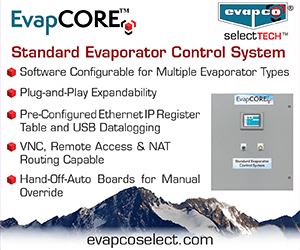Chairman’s Message

We’re building upon our industry’s body of knowledge, influencing code development with our Standards, working with regulators at OSHA and the EPA and developing new educational programs for our members.
It is your support that makes this organization what it is, so if you have recently joined IIAR, welcome. I encourage you to look for ways to get involved in our member volunteer work.
If you are already actively engaged in our committees and programs, I encourage your continued participation and thank you for your help in enabling our natural refrigeration industry to meet the new challenges ahead.
We have a great launch pad for the journey ahead, having just concluded the most successful Conference and Exhibition in IIAR’s history. The exchange of knowledge, understanding of developments and value of the networking that occurs at this event energizes our industry. The financial success that our organization derives from the IIAR Conference enables us to enhance services, such as our advocacy programs.
Our advocacy programs, which focus on significant regulatory developments impacting our industry, resumed immediately following the 2016 IIAR Conference.
Immediately after that conference, IIAR Government Relations Director, Lowell Randel, spoke at a public hearing hosted by the EPA regarding proposed changes to the Risk Management Program (RMP) rule.
The EPA’s proposed rule changes included new requirements for independent third-party audits by PE licensed auditors.
They also include root cause analysis after near misses and annual emergency response coordination with local emergency planning organizations. These are all important regulatory concerns for our industry.
As an example, consider that the proposed EPA independence requirements for auditors bars them from conducting services or consulting for the owner or operator within the last three years – or providing such services for a period of at least three years following the audit.
In a review of his discussions with IIAR members who conduct audits as well as other contracted services, Lowell advised the EPA panel that he asked these members to quantify the number of clients for whom they solely performed audit services. Unsurprisingly, the answer was zero.
EPA’s proposed independence requirements would therefore effectively disqualify our industry’s most qualified auditors. As it is not EPA’s intent to negatively impact the professionalism of compliance audits, it is important for this message and for IIAR’s voice to be heard.
These are the sorts of regulatory issues that require attentiveness and action on the part of IIAR. And this is the type of realistic, pragmatic advocacy we intend to continue to provide.
We are also moving forward this year on other key initiatives, such as our major educational initiative, the IIAR-2 certificate program, which will document core knowledge in the safe design of ammonia refrigeration systems.
Following our successful IIAR-2 education program, as presented in Orlando, both our members and regulators reached out to us to provide an enhanced, documented training program. We are responding.
I am very aware of the contributions of all those who have built and continue to build the IIAR, and as your new chairman, I feel a great sense of responsibility to honor those efforts through my own commitment in the year ahead, to help us to advance the causes and to address the needs of our members.
We are all fortunate to be part of a vibrant, vital and growing organization that advances the virtues of environmental responsibility, energy efficiency and safe practices.
As members, your ongoing work and participation make all of our activities possible. Thank you for enriching our industry with your support.












